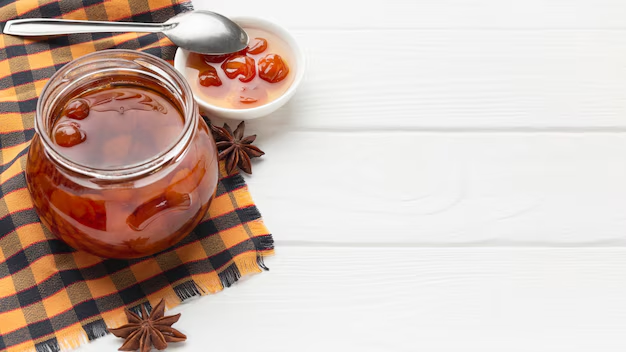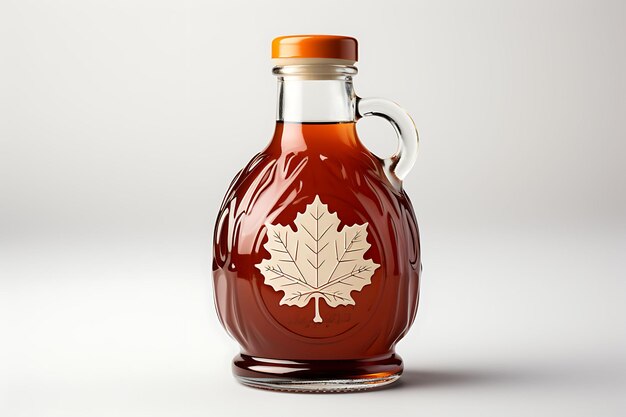Maple syrup is a popular natural sweetener in the United States, widely used in pancakes, waffles, and baking. Its rich flavor and natural origin make it a favorite among those seeking alternatives to refined sugar. But the question remains, “Is maple syrup healthy?” While it’s a more natural option than many sweeteners, its health benefits and drawbacks are still debated. This article explores the nutritional profile, potential health benefits, and impact on blood sugar to help you make an informed choice.
What Is Maple Syrup?
Maple syrup is a natural product derived from the sap of sugar maple trees. Its production involves a careful process to ensure purity and flavor.
How Maple Syrup Is Made
The process begins in early spring when maple trees are tapped. The collected sap is then boiled to evaporate water, leaving behind the thick, sweet syrup. This process concentrates the sugars naturally found in the sap while retaining its unique flavor.
Pure Maple Syrup vs. Artificial Syrups
Pure maple syrup comes directly from tree sap and contains no artificial additives. It’s graded based on color and flavor, with darker syrups offering a stronger taste.
In contrast, artificial syrups are often made from high-fructose corn syrup and flavored with chemicals. These lack the nutritional benefits of pure maple syrup and are less healthy.
Nutritional Profile of Maple Syrup
To understand its health implications, let’s break down what’s inside maple syrup.
Caloric Content and Macronutrient Breakdown
One tablespoon of maple syrup contains:
- Calories: About 52.
- Carbohydrates: 13 grams, primarily from natural sugars.
- Fat: 0 grams.
- Protein: 0 grams.
While it is calorie-dense, its sweetness means you can use less compared to table sugar.
Vitamins and Minerals
Maple syrup provides small amounts of essential nutrients, including:
- Manganese: Supports bone health and metabolism. One tablespoon provides about 33% of the daily recommended intake.
- Riboflavin (Vitamin B2): Plays a role in energy production.
- Zinc: Supports the immune system.
- Calcium and Potassium: Beneficial for bone and heart health, though present in smaller amounts.
Comparison With Other Sweeteners
- Maple Syrup vs. Honey: Both are natural and contain similar calories, but maple syrup has fewer total sugars and more minerals like manganese.
- Maple Syrup vs. Agave Nectar: Agave has a lower glycemic index but contains higher fructose levels, which can stress the liver.
Antioxidant Properties
One of maple syrup’s unique qualities is its antioxidant content, which provides added health benefits.
Antioxidants in Maple Syrup
Maple syrup contains polyphenols, a type of antioxidant that helps combat oxidative stress. These compounds may reduce inflammation and protect cells from damage caused by free radicals.
Darker vs. Lighter Syrups
Darker maple syrups, such as Grade A Dark or Grade B, have higher levels of antioxidants compared to lighter syrups. This is because they are made from sap collected later in the season, which is more concentrated. If you’re seeking the health benefits of antioxidants, opting for darker syrup is a better choice.
Glycemic Index and Blood Sugar Impact
Managing blood sugar levels is a concern for many, especially those with diabetes. Maple syrup’s glycemic index (GI) plays an important role in understanding its effect on blood sugar.
What Is the Glycemic Index?
The glycemic index measures how quickly a food raises blood sugar levels. Foods with a high GI are digested quickly, causing rapid spikes in blood sugar.
Maple Syrup’s GI Compared to Other Sweeteners
- Maple Syrup: GI of 54, which is considered medium.
- Table Sugar: GI of 65, higher than maple syrup.
- Honey: GI of 58, slightly higher than maple syrup.
While maple syrup has a lower GI than sugar, it can still raise blood sugar levels if consumed in large amounts. Moderation is key, especially for individuals with diabetes or insulin resistance.
Implications for Blood Sugar Management
Because maple syrup is less processed, it causes a slower and steadier rise in blood sugar compared to refined sugar. This makes it a slightly better option for those monitoring their blood sugar, though it should still be consumed in moderation.
Related to Read: Maple Coconut Pumpkin Butter (a.k.a. No-Bake Vegan Pumpkin Pie Filling)
Potential Health Benefits
Maple syrup isn’t just a sweetener; it may also offer some health advantages.

Anti-Inflammatory Properties
Polyphenols in maple syrup have anti-inflammatory effects, which may benefit individuals with chronic conditions like arthritis. By reducing inflammation, these compounds support overall health.
Possible Anticancer Effects
Preliminary studies suggest that certain compounds in maple syrup, such as quebecol, may have anticancer properties. While these findings are promising, more research is needed to confirm their effects in humans.
Benefits Over Refined Sugar
Refined sugar lacks nutrients and can stress the liver. Maple syrup, on the other hand, contains minerals and antioxidants, making it a more wholesome option. It also tends to be less processed, which reduces its overall impact on the body.
Health Risks and Considerations
While maple syrup has nutritional benefits, its high sugar content raises some health concerns.
High Sugar Content and Associated Health Risks
Maple syrup is composed mainly of sucrose, a type of sugar. Consuming too much sugar is linked to obesity, type 2 diabetes, and heart disease. Over time, excessive intake can lead to insulin resistance and increased fat storage, particularly around the abdomen.
Importance of Moderation
Because it is natural, many people assume maple syrup is harmless. However, even natural sweeteners should be consumed in moderation. The American Heart Association recommends limiting daily added sugars to:
- 25 grams (6 teaspoons) for women.
- 36 grams (9 teaspoons) for men.
With one tablespoon of maple syrup containing about 13 grams of sugar, it’s easy to exceed these limits.
Potential for Overconsumption
The natural origin of maple syrup can lead to overuse, as it feels like a healthier alternative. This is particularly true in diets where it is used as a sugar substitute. Careful portion control is essential to avoid unintended health consequences.
Maple Syrup vs. Other Sweeteners
When choosing a sweetener, it’s essential to compare options to find the best fit for your dietary needs.
Comparison With Artificial Sweeteners
Artificial sweeteners like aspartame and sucralose are calorie-free but often highly processed. While they don’t raise blood sugar, some studies link them to gut microbiome disruption and potential long-term health effects. Maple syrup, being natural, avoids these risks but comes with calories and sugar content.
Evaluation Against Natural Sweeteners
- Maple Syrup vs. Honey: Honey contains slightly more calories but offers antimicrobial properties. Both are rich in antioxidants, though maple syrup has fewer sugars.
- Maple Syrup vs. Coconut Sugar: Coconut sugar has a similar calorie count but a lower glycemic index. However, it lacks the nutrient content found in maple syrup.
Pros and Cons of Maple Syrup
Pros:
- Natural source of sweetness.
- Contains vitamins, minerals, and antioxidants.
- Less processed than refined sugar.
Cons:
- High in sugar and calories.
- Limited benefits unless consumed in small amounts.
- Can be expensive compared to alternatives.
Recommendations for Consumption
Incorporating maple syrup into your diet requires a balanced approach.
Guidelines on Daily Sugar Intake
Follow these recommendations to avoid excessive sugar consumption:
- Limit added sugars to no more than 5-10% of your daily caloric intake.
- Use a measuring spoon to control portions.
Tips for Incorporating Maple Syrup
- As a Sweetener: Use in small amounts to sweeten oatmeal, yogurt, or smoothies.
- For Cooking: Replace sugar with maple syrup in baked goods, but reduce the liquid in the recipe to maintain consistency.
- In Marinades and Sauces: Combine with mustard, soy sauce, or vinegar for added flavor.
Selecting High-Quality Maple Syrup
Choose pure maple syrup labeled as Grade A, which is free from additives. Avoid imitation syrups that often contain high-fructose corn syrup. Darker syrups provide a richer flavor and higher antioxidant levels.
Recent Research and Developments
Scientists have been exploring the potential health benefits of maple syrup beyond its nutritional content.

Summary of Latest Studies
- Anti-Inflammatory Effects: Studies suggest that the polyphenols in maple syrup may reduce inflammation and improve heart health.
- Anticancer Potential: Research indicates that compounds like quebecol, formed during the syrup production process, may have anticancer properties.
- Gut Health: Early findings suggest that certain components in maple syrup may support a healthy gut microbiome, though more research is needed.
Ongoing Research
- Investigating the use of maple syrup extract as a natural preservative in foods.
- Studying its effects on metabolic health and insulin sensitivity.
- Exploring its potential to combat antibiotic-resistant bacteria.
Related to Read: Date Syrup
Conclusion
Maple syrup is a natural, nutrient-rich alternative to refined sugar. It contains beneficial antioxidants and minerals like manganese and riboflavin, making it a healthier option when used sparingly. However, its high sugar content means it should be consumed in moderation to avoid health risks like obesity and diabetes.
When compared to other sweeteners, maple syrup offers unique advantages but is not without its limitations. Recent research highlights its potential as more than just a sweetener, but further studies are needed to confirm its health claims.
By understanding its benefits and risks, you can enjoy maple syrup as part of a balanced and mindful diet.
FAQs
1. Is maple syrup better than table sugar?
Yes, maple syrup is less processed and contains vitamins and antioxidants. However, it is still high in sugar and should be consumed in moderation.
2. Can maple syrup help with weight loss?
No, maple syrup is calorie-dense and not suitable for weight loss if overconsumed. Use it sparingly as part of a balanced diet.
3. How can I tell if maple syrup is pure?
Look for labels that say “100% Pure Maple Syrup.” Avoid products with added ingredients like high-fructose corn syrup.
4. Does maple syrup expire?
Yes, pure maple syrup can spoil if not stored properly. Keep it refrigerated after opening and check for mold before use.
5. Are there any side effects of consuming maple syrup?
Consuming too much can lead to weight gain, increased blood sugar levels, and dental issues. Always use it in moderation.

